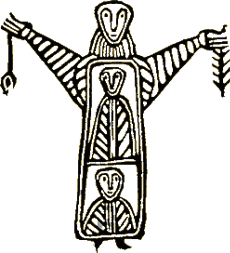TV show , "Those who", June 1996.
D.P.: Actually , the very first idea - the one those old women , very frail and weak , contrived (just totally by accident one day I saw them in the village, I wasn’t folklorist yet ) without straining, without blushing , to give the sound volume nearly jet engine. This is such power that tears are flowing from my eyes just on the power of the sound. And I began to study the spectral analysis , X-ray boldly did, the frequency of all ..
Interviewer: Made the discovery by a Nobel Prize?
D.P.: Did , yes, but not for the Nobel Prize , but for folk music ensemble . Actually , the band in the beginning - it's the guys that took place in the experiment itself , so put his lips , so take a breath , inflate it , and so on - make a sound for the method, which , as I thought , I opened it.
Interviewer: In fact, you can check the harmony with algebra ?
D.P.: Of course , that's what I did back then. And when I checked , I thought I was - Schizophrenic - because I see what it is and do not understand - why no one is singing like that , why those who sings so - do not understand what they are doing! I taught conducting and then persuaded my students just to try. This was the first part of the Ensemble, which was in vogue, because we went out into the hall , and made sound without speakers and microphones , and we even brazenly took part in the 2nd competition entertainers together with Alla Pugacheva.
Interviewer: Yeah, hard to imagine you with a "phonogram " .
D.P.: Yes, and here we went (we were called "Ensemble of Composers' Union " ) , the Commission was waiting when we start something there to set up, and we suddenly shouted in the hall, and Silant'ev - he was then chairman - has fallen from chair in surprise.
Interviewer: In the truest sense ?
D.P.: In the literal sense , of course. On what then , in fact , the Ensemble came into existence. Now that - now that no one smite , but then it hit . And we could , really. You see , while the ears are beginning to work in a different way at all - when all along , a few people start to sing , and, in the village - there are nobody with conservatory education , but the singers are very good, and hear well . And you , too, you can so , that's for sure .
Interviewer: This is achieved by exercise?
D.P.: No. Chutzpah is definitely needed , but for a start. The fact that later this sound should be controlled - it is much more difficult.
Radio program "Sivcev Vrazhek", April 1993, conversation with Snezhana Krasinsky.
S.K.: Is it true that in the early days of your team you basically refused costumes on stage?
D.P.: Yes, you 're right, we did refuse from the costumes on stage and on a fairly simple reasons : those to whom we come into the village , and who sings these songs for us , they do not wear costumes to sing with us, they dressed in their normal suits. We wanted to check out from this seemingly popular , sometimes “a la russe”, pseudofolk ( but , more importantly, looking folk ) art, and tried to show the essence of it. This was our main desire is to tell the truth , you know , like Musorgsky. To there we show what is popular , what we have seen and we do not need to dress up in anybody - that's us. And you too can go there and so will sing too. You know , then no one is singing like that, no one at all! Now it's hard to believe, but then we were trying to convince people that it is possible ,that this is your really songs , your people , and you are part of it - and convinced! This is perhaps the most important thing that our band has done over the years of its existence - the first big , big win
S.K.: Narrow , please , this moment - that is changing for the viewer - it is clear, too, although this is a lot to say - but what is changing for the artist when he puts on folk costume and take the stage ?
D.P.: When the actor is on a stage without a suit - it is , in fact, not an artist ,but a man came on the scene , the same as the people sitting in the hall. This person can do something that people in the audience can’t do or can - it doesn’t matter , but today he went out . This is one . When the artist puts on a suit , he sometimes still puts make-up, it's a kind of mask - he becomes a character , he must renounce himself at this time . At this stage there is no this man - he makes certain movements , it behaves a certain way, not the way he would behave in his own life, he can’t afford much , but it gives the opportunity to create a very special atmosphere , the atmosphere of the closed- art space , and for that, in general, artists, actors , stage designers put on costumes for stage.
The fact is that even when we get on stage and give up suits, when I say that at the scene is just a man from the audience – it’s the same artistic image , we are artists , and goes on stage anyway - artist who plays a man from the audience , in order to convince people of something , to create something .
S.K.: That is , all the same , the interpretation of tradition?
D.P.: Yes, but in any case we don’t belong to this tradition . After all, for to belong to the tradition should not just be able to sing the way they sing them out there , you need to be able to create new songs , you need this to become your own tongue , your daily life. After all, tradition does not exist on the stage and never would not live on the scene. At stage lives scenic tradition - it is an art. Here, in this tradition we belong, and, most of all, we’ll keep it .
TV show "Rush Hour", 1995
Interviewer: If a person is singing - it was good . Why ?
D.P.: First, because it works off a negative reaction to this very life , the second, because it is a very good way of dealing with other people, which opens a line of pure emotion, pure transmission of emotion, the net transfer of internal state and people take advantage of this when they sing - and that's good . Third, if a man began to sing - it means he wants to live , because if he does not want to live - you just can not force it in any way , even by force , and if he sang it means that something still is into him
TV show "Beau Monde", 1993
D.P.: Here we mash the future of our music culture - along with many others, who does it also. I'm not saying it's just us, but we are now a little - a little piece of what will be tomorrow , that is for the moment when it has accumulated quite a lot. And I think it's - the main thing that we do.





